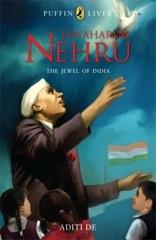
IT'S that time of the year again when little children around the country are celebrated on independent India's first Prime Minister, Jawaharlal Nehru's birthday. With red roses neatly pinned to their buttonholes and a Nehru cap placed gingerly on their heads, it's a tribute to not just Nehru's apparent love for children, but also a silent reminder of the sacrifices he made throughout his life to create the India of his dreams for the next generation. Reading Puffin Lives' 'Jawaharlal Nehru - The Jewel of India' by Aditi De is perhaps the perfect gift this year, both for Chacha Nehru and ourselves, as through the menagerie of anecdotes presented, we get a glimpse of the man behind the legendary Nehru.
The book begins with a rather endearing and unexpected incident of a young Nehru stealing a pen from his father's desk and getting caught. It cleverly showcases a very human aspect of his life, making the reader immediately relate to him. Right then, you feel like you are walking with Nehru, instead of reading about him from the outside.
We experience his luxurious childhood with the same equanimity of Nehru; we experience the broadening of his mind's horizon abroad with the same awe and respect; we experience his first brush with India's rural side, the struggle with his own identity with the same idealism; we see his growing relationship with Gandhiji with the same adulation and reverence; we feel his claustrophobia and subsequent 'freedom' in jail with the same wisdom; we experience the beauty of nature and its many wonders with the same tenderness; we experience his tumultuous affair with politics with the same verve and dynamism; we experience the many facets of his relationship with this family with the same love; and finally, we hear him give his famous speech at India's hour of independence with the same patriotism and humility.
What stays with you at the end of the book is the long, arduous journey of mind, body and soul that Nehru went through, mirroring that of several others, before India attained its independence, in a language that appeals to both child and adult. Even though the book ends with a brief chapter on Nehru as Prime Minister, we are able the grasp the magnitude of his responsibility and appreciate his contributions even more. Most importantly, Aditi consciously refrains from idolising him, a natural tendency for any biographer, giving us a very human Nehru - one who makes mistakes and falls down, but always learns to pick himself up and continues walking ahead. His life teaches us that it is only the intention in the heart that matters, and what better way to remember this towering Indian than to gift books about him to children on Children's Day!